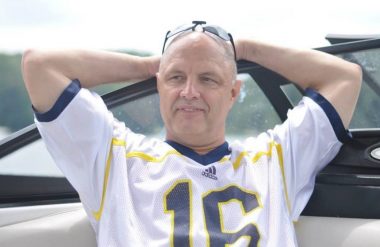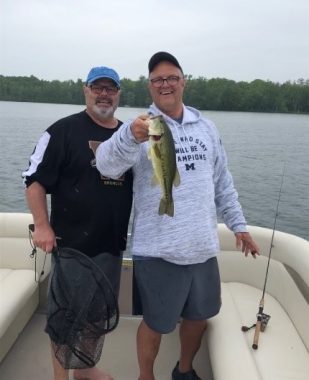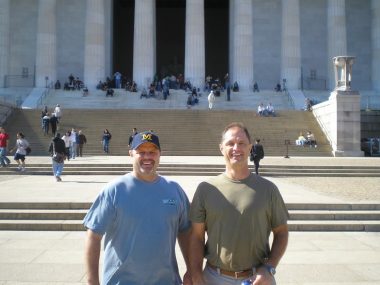When ALS Leads to Dysarthria, a Loved One Offers a Gift
Technology and family helped when this columnist's late husband lost his voice

For my late husband, Jeff, and me, the most difficult and saddening aspect of his ALS progression was the loss of his voice.
It was heartbreaking for both of us when he lost the ability to speak, also known as dysarthria, early in his condition. Much of Jeff’s identity was based on his wit and sense of humor, both of which relied on nuanced turns of phrase and inflection, along with his love of invented acronyms and words.
I remember being caught off guard at the speed with which Jeff lost his voice, as it seemed to me out of order — something I later came to understand is characteristic of the seeming randomness of ALS. His symptoms had until that point been specific to his legs and gait. While his voice had been slurring and slightly faltering for a few months, I was on a business trip when I remember no longer being able to understand him during my phone calls home. This was jarring and sad for both of us.
Like many couples, over the course of our relationship we’d developed our own means of communication, using inside jokes and spoken shorthand for the things we wanted to say to each other. With friends and family, too, his voice provided a means to express his point of view, share thoughts, and gently tease. And as he was an occasional public speaker on security issues, his spoken words conveyed knowledge and credibility.
It was clear that losing his voice felt like losing an important aspect of his identity.

Jeff enjoys a summer day of powerboating before his ALS diagnosis. (Photo by Juliet Taylor)
Fortunately, one of Jeff’s prominent character traits was ingenuity, an attribute that surfaced repeatedly during our time living with his ALS. I could see it in the way he developed workarounds and systems for daily activities, things that were important for him to be able to do on his own for as long as he could. While concerned by losing his primary means of communication, he approached losing his voice with the same sense of innovation.
After a visit to look at speech-assisting technologies on display at the local ALS Association chapter, Jeff began further investigating text-to-speech applications that could take a sentence he typed and speak it out loud, projecting an entire text in spoken words. Better yet, the technology could be used from his phone, providing convenience and portability.
On that same visit to the ALS Association, we also learned about voice banking, which creates a synthetic version of a person’s own voice. Integrated with text-to-speech technology like the application installed on Jeff’s phone, a banked artificial voice would, we learned, sound a lot like him. This was an encouraging development, providing a bit of hope in a distressing situation.
There was just one issue with voice banking: Jeff’s voice was fading fast, and we weren’t sure he’d be able to complete the hours of recording required to bank hundreds of words and sentences to generate his voice. He could probably get it started, but wouldn’t be able to finish.
That’s where one of the most beautiful gifts of our time living with ALS came in: the gift of voice.
Peas of a pod
Jeff and his brother Steve were two of a kind, so alike that they shared a birthday, two years apart. They fished together, attended college together, and shared an encyclopedic knowledge of music as well as a love of scratch cooking, dogs, and all things Polish. And Steve and Jeff sounded exactly alike. Even their inflection was identical.

Jeff, right, and his brother Steve fish in Interlochen, Michigan, in June 2019. (Courtesy of Juliet Taylor)
Steve willingly gave of his time — many hours, in fact — to vocalize and record all of the words and sentences that Jeff used to help stay as much of himself as possible. Steve’s gift enabled Jeff to enjoy a voice that was truly indistinguishable from his own. It helped preserve his sense of humor, his presence and participation in conversations, his ability to communicate about his healthcare needs, and his dignity.
For the remainder of Jeff’s time living with ALS — more than a year — he enjoyed the gift of retaining his own voice. By texting what he wanted to say, he could project his words and retain a critical part of his identity.
Emotionally, there’s no doubt that losing his voice was difficult. It was still frustrating for Jeff when conversation passed him by, as spoken conversation tends to move more quickly than anyone can type. But that we could adapt to with patience.
Technology has evolved in the three ensuing years since Steve shared his voice with Jeff. Today, volunteers bank voices for others to choose from and use, exponentially repeating the gift that Jeff received from Steve.
Through technology, generosity, and family kindness, our time living with Jeff’s ALS was made better. I will be forever grateful for this gift.

Jeff, right, and his brother Steve spend time together in Washington, D.C. (Courtesy of Juliet Taylor)
Note: ALS News Today is strictly a news and information website about the disease. It does not provide medical advice, diagnosis, or treatment. This content is not intended to be a substitute for professional medical advice, diagnosis, or treatment. Always seek the advice of your physician or other qualified health provider with any questions you may have regarding a medical condition. Never disregard professional medical advice or delay in seeking it because of something you have read on this website. The opinions expressed in this column are not those of ALS News Today or its parent company, Bionews, and are intended to spark discussion about issues pertaining to ALS.








Louis Savarese
Thank you so much for sharing Jeff's courage and resourcefulness. Jeff sounds like a great American with that can do spirt and never give up.. I say sounds in the present tense as I believe Jeff lives on with our Creator and this short life is much akin to the rainbow bridge. God Bless you and your family.
Juliet Taylor
Thank you so much Louis for reading and taking the time to comment, and for your kind words of reassurance. He was a great person and writing this column helps me remember. I think of him in the present tense too.
Ruth Brunton
This strikes a chord with us . A very similar story where I lost my voice early on and quickly .
We have just finished an interview with the BBC Radio 4 about our experience and voice banking.
Juliet Taylor
Thank you Ruth for reading and for sharing your own experience. I'd really enjoy hearing your BBC interview once it airs.
Dick Fitzpatrick
Ruth, I would be very interested as well.
Ruth Brunton
www.bbc.co.uk/sounds/play/m001g35d our part starts at around the 20minute mark
Dick Fitpatrick
Juliet, thank you for your post. My wife of nearly 50 years was diagnosed with Bulbar in July 2022 after several months of being treated for “hoarseness”. Her speech is no longer understandable and it has been difficult for her particularly since she was speaking clearly less than 6 months ago. Fortunately we have text/voice app, microphone, amplifier, erasable note board etc. We are lucky that we live in New Hampshire and have easy access to Mass General and Boston Children’s ALS Speech Center. Karen, my wife, is adjusting reasonably ok. It is the rest of the family that needs to adjust more quickly. I for one, was focused on what Karen could do to help me better understand her communication, spent little time on what I could do. We are now working on slowing discussions down, making a more concerted effort to include Karen, SHUT UP AND FOCUS when Karen signals she wants to speak, no essay questions etc. We have a way to go but we are making progress. Your post really hit home.
Best
Dick Fitzpatrick
Juliet Taylor
Thank you Dick for sharing your story and experience. You make many really good points and the one that stood out most to me was to focus when Karen wants to speak. Jeff would get frustrated when the conversation moved on without him. It is so important to help our loved ones be heard in whatever form they are using to communicate. Thanks so much for reading and commenting.